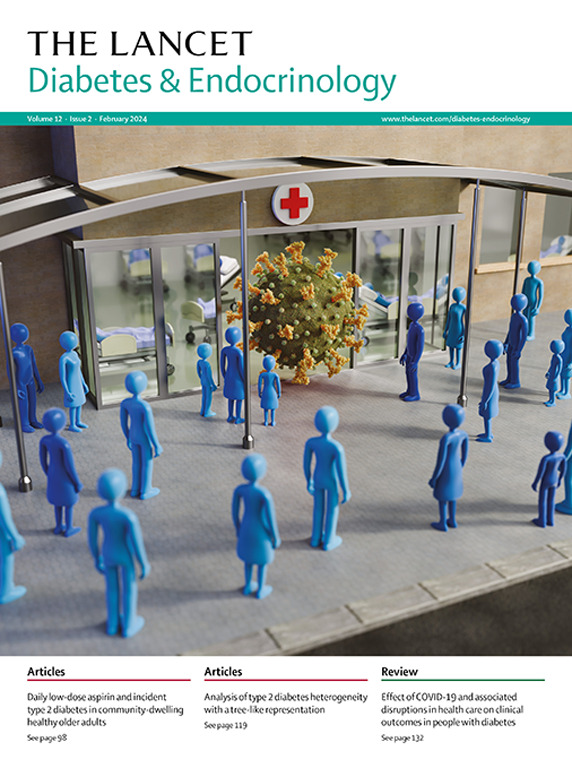连续血糖监测在瑞士妊娠糖尿病管理(DipGluMo):一项开放标签、单中心、随机对照试验
IF 44
1区 医学
Q1 ENDOCRINOLOGY & METABOLISM
引用次数: 0
摘要
在妊娠期糖尿病中,血糖控制是影响围产期结局的关键因素之一。我们的目的是研究实时连续血糖监测(rtCGM)与自我血糖监测(SMBG)对围产期结局的影响。方法在这项开放标签、随机对照试验中,我们根据国际糖尿病和妊娠研究小组协会的标准,从瑞士伯尔尼的一所大学医院招募了年龄在18-45岁的妊娠糖尿病患者。参与者被随机(1:1)分配到rtCGM干预组或SMBG对照组。随机化主要基于孕前BMI、既往妊娠糖尿病、2型糖尿病家族史和种族。主要终点是围产期结局的综合:胎龄大、巨大儿、羊水过多、新生儿低血糖和死产。关键的次要结局是患者偏好和产妇血糖控制。分析是在意向治疗基础上进行的。该试验已在ClinicalTrials.gov注册,编号NCT05037526。在2021年9月29日至2024年6月11日期间,302名患有妊娠糖尿病的孕妇被纳入研究,并随机分配到其中一组。156名参与者被分配到rtCGM干预组,143名参与者被分配到SMBG对照组完成了研究。299名参与者中有297名(99%)可获得主要结局数据。两组的综合结局无显著差异(优势比1.02 [95% CI 0.63 - 1.66])。唯一的不良事件是皮肤变化,发生在rtCGM干预组的6名(4%)参与者和SMBG对照组(盲法装置)的1名(1%)参与者中。我们的研究结果表明,妊娠期糖尿病患者的预后并没有因使用rtCGM而得到改善。然而,个体对rtCGM装置表现出更高的偏好。这一发现提示rtCGM可用于简化妊娠期糖尿病的管理。成本效益研究可以解决哪种方法需要更少的资源。据我们所知,这是第一个评估rtCGM对妊娠结局疗效的随机试验。伯尔尼大学和瑞士糖尿病基金会。摘要的德文译本见补充资料部分。本文章由计算机程序翻译,如有差异,请以英文原文为准。
Continuous glucose monitoring in the management of gestational diabetes in Switzerland (DipGluMo): an open-label, single-centre, randomised, controlled trial
Background
In gestational diabetes, one of the key factors affecting perinatal outcomes is glycaemic control. We aimed to investigate the effect of real-time continuous glucose monitoring (rtCGM) on perinatal outcomes versus self-monitoring of blood glucose (SMBG).Methods
In this open-label, randomised, controlled trial, we recruited pregnant individuals aged 18–45 years with gestational diabetes, according to the International Association of Diabetes and Pregnancy Study Groups criteria, from a university hospital in Bern, Switzerland. Participants were randomly assigned (1:1) to the rtCGM intervention group or the SMBG control group. Randomisation was done centrally on the basis of pre-pregnancy BMI, previous gestational diabetes, family history of type 2 diabetes, and ethnicity. The primary endpoint was a composite of perinatal outcomes: large for gestational age, macrosomia, polyhydramnios, neonatal hypoglycaemia, and stillbirth. Key secondary outcomes were patient preference and maternal glycaemic control. Analyses were conducted on an intention-to-treat basis. This trial is registered with ClinicalTrials.gov, NCT05037526.Findings
Between Sept 29, 2021, and June 11, 2024, 302 pregnant women with gestational diabetes were included in the study and randomly assigned to one of the groups. 156 participants were assigned to the rtCGM intervention group and 143 were assigned to the SMBG control group completed the study. Primary outcome data were available for 297 (99%) of 299 participants. The composite outcome did not differ significantly between the two groups (odds ratio 1·02 [95% CI 0·63–1·66]). The only adverse events were skin changes, occurring in six (4%) participants in the rtCGM intervention group and in one (<1%) participant in the SMBG control group (blinded device).Interpretation
Our results show that the outcome in individuals with gestational diabetes is not improved by the use of rtCGM. However, individuals expressed a higher preference for the rtCGM device. This finding suggests that rtCGM could be offered to simplify the management of gestational diabetes. A cost-effectiveness study could address what method requires fewer resources. To our knowledge, this is the first randomised trial powered to evaluate the efficacy of rtCGM regarding pregnancy outcomes.Funding
The University of Bern and the Swiss Diabetes Foundation.Translation
For the German translation of the abstract see Supplementary Materials section.求助全文
通过发布文献求助,成功后即可免费获取论文全文。
去求助
来源期刊

The Lancet Diabetes & Endocrinology
ENDOCRINOLOGY & METABOLISM-
CiteScore
61.50
自引率
1.60%
发文量
371
期刊介绍:
The Lancet Diabetes & Endocrinology, an independent journal with a global perspective and strong clinical focus, features original clinical research, expert reviews, news, and opinion pieces in each monthly issue. Covering topics like diabetes, obesity, nutrition, and more, the journal provides insights into clinical advances and practice-changing research worldwide. It welcomes original research advocating change or shedding light on clinical practice, as well as informative reviews on related topics, especially those with global health importance and relevance to low-income and middle-income countries. The journal publishes various content types, including Articles, Reviews, Comments, Correspondence, Health Policy, and Personal Views, along with Series and Commissions aiming to drive positive change in clinical practice and health policy in diabetes and endocrinology.
 求助内容:
求助内容: 应助结果提醒方式:
应助结果提醒方式:


